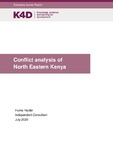| dc.contributor.author | Haider, Huma | |
| dc.coverage.spatial | Kenya | en |
| dc.date.accessioned | 2020-08-06T13:04:40Z | |
| dc.date.available | 2020-08-06T13:04:40Z | |
| dc.date.issued | 2020-07 | |
| dc.identifier.citation | Haider, H. (2020). Conflict analysis of North Eastern Kenya. K4D Emerging Issues Report 36. Brighton, UK: Institute of Development Studies | en |
| dc.identifier.uri | https://opendocs.ids.ac.uk/opendocs/handle/20.500.12413/15570 | |
| dc.description.abstract | This Emerging Issues report highlights research and emerging evidence to policy-makers to help inform policies that are more resilient to the future. It provides comprehensive conflict analysis of North Eastern Kenya by outlining the conflict profile in the region and exploring the root causes of conflict that are coming from the elite power struggles, regional inequality and marginalisation, weak social contract, and resource and environmental factors. This report also identifies the conflict dynamics from five different aperspectives: cross-border conflict, devolution, hate speech, security issues, and radicalisation and violent extremism. The literature reviewed in this paper notes that the sources of resilience and resilience actors in North Eastern Kenya can be double-edged and contribute to both peace and insecurity. Devolution, for example, remains an important source of resilience although it has also exacerbated clan conflicts. Similarly, elders have been effective at peace-making, while at other times they have contributed to violence through their staunch support of particular clans. Citizenship, social cohesion and social contract are one of the key source of resilience through the creation of new narratives of collaboration and Kenyan citizenship, i.e. joint local initiatives, to achieve mutual goals and practical help (e.g. shared public spaces, such as markets, schools, and hospitals that can foster unity). Other key sources of resilience identified in the literature are: strengthened security arrangements and police-civilian trust, transitional justice, peace committees, traditional elders and Council of Elders, Religious leaders and inter-faith dialogue, media, and business. | en |
| dc.language.iso | en | en |
| dc.publisher | Institute of Development Studies | en |
| dc.relation.ispartofseries | K4D Emerging Issues Report;36 | |
| dc.rights.uri | https://www.nationalarchives.gov.uk/doc/open-government-licence/version/3/ | en |
| dc.subject | Governance | en |
| dc.subject | Politics and Power | en |
| dc.subject | Rights | en |
| dc.subject | Security and Conflict | en |
| dc.title | Conflict Analysis of North Eastern Kenya | en |
| dc.type | Emerging Issues Reports | en |
| dc.rights.holder | © DFID - Crown copyright 2020 | en |
| dcterms.dateAccepted | 2020-07 | |
| rioxxterms.funder | Department for International Development, UK Government | en |
| rioxxterms.identifier.project | K4D | en |
| rioxxterms.version | VoR | en |
| rioxxterms.funder.project | 238a9fa4-fe4a-4380-996b-995f33607ba0 | en |

